#post blood and wine
Text
Pride
Winter was finally arriving at Kaer Morhen. The nights were getting colder and it wouldn’t be long until the path was fully covered.
The fire crackled in the hearth in the center of their chamber, setting the room in a light glow. Wind whistled through the cracks of the old witcher fortress.
Geralt held Yennefer close, their legs intertwined and the sheets disarrayed. He nuzzled her neck, taking in her intoxicating scent. He rested a hand on her flat stomach and kissed her shoulder.
“I love you, Yen,” he whispered to her.
Whimpers broke the peaceful silence and quickly became a piercing wail.
Yennefer stirred next to him, a light smile on her lips. “She’s awake.”
“I got her,” Geralt said, “You go back to sleep.” He untangled his legs from hers as he could and leapt to his feet.
The cradle was on Yennefer’s side of the bed, further from the windows. The baby had managed to get her pudgy arms out of the swaddle. Her cheeks were red and her eyes filled with tears. As Geralt leaned over her, her arms flailed up towards him, begging to be held.
Geralt placed one hand under her head and the other under her back just as the midwife had shown him and lifted her to his chest. Her flailing ceased and her cries quieted to whimpers.
Beside him, Yennefer pulled the blanket back around her, her black hair spilling across the white sheets. He smiled at the sight of her.
“Shh, little wolf,” he consoled, “Let your mother rest. Come on, let’s get some air.” The baby didn’t offer any disagreement.
Geralt made his way out of their room as quietly as he could. The sky was clear and the full moonlight lit up the inner courtyard. Geralt pulled the blanket tighter and held her close.
Geralt paced along on the inner wall of the keep. The babe’s discontent cries dwindled and soon her breaths were even and calm with sleep.
“I thought I might find you out here.”
Geralt looked behind him to find Vesemir, arms crossed and eyes gentle as he leaned against a stone doorway.
Geralt grinned at the sight of him and nodded in greeting. “What are you doing up? I thought you planned to have an early start on the armory walls in the morning.”
Vesemir stood next to him and gave him a wistful look. “The armory can wait. I heard you walking around and thought I might come meet the newest pup.”
Geralt turned and angled his arms so that Vesemir could clearly see the sleeping babe’s face. She turned her face towards her father’s chest for warmth. A few wisps of her fine, snow white hair peaked out from the blanket.
Vesemir pulled down the swaddling around her mouth to get a better look. “She’s a beautiful girl, Wolf. What did you name her?”
“Laurentia,” Geralt answered with pride. “Laurentia of Corvo Bianco.”
Vesemir nodded in approval. “Toussaintois meaning laurel plant, or, more figuratively, ‘place of victory and honor’. It’s a good name, a strong one. She’ll wear it well.”
Laurentia stirred and opened her eyes. She stared wide-eyed up at Vesemir. Her irises were a lovely violet color and her pupils were slit and cat-like.
“Hmm, eyes of a witcher,” said Vesemir thoughtfully. “She’ll need to be trained if she has the abilities of one.”
Geralt tensed at that. He looked over the courtyard where he spent thousands of hours training. He and his brothers were trained relentlessly and cruelly from the moment they arrived at Kaer Morhen to the moment they proved they can survive well enough to go out on The Path. Then even after all that, some still didn’t make it back for the next winter.
That was the courtyard that held pyres for the boys that didn’t survive to see the Path. The courtyard where bones were broken for the slightest mistake, whippings and beating dealt out for failure, and even death when a spar or punishment went too far.
Past the walls were the lake where some of the youngest drowned getting tossed in too deep of water too far from shore too soon, the caves where old Spearmint was the death of others so close to the end of their training, and the bastion that held bones of boys killed in the pogroms.
Geralt let out an uneasy breath. “It’s early to consider. First she needs to work on sitting up and crawling.”
Vesemir looked at Geralt with sad eyes and stood beside him, overlooking the sight where many trained but few ever left alive. “Looking back, Wolf, I wished it were different, all of it. If I knew what I know now, I like to think I would have done different.”
Geralt hummed and looked down at Laurentia. She had already closed her eyes and was starting to drift back to sleep.
“I regret the things you and your brothers were put through. For me and the other trainers, how we taught was the same as we had learned. It never occurred to me until it was vastly too late that I didn’t have to do as my elders did.” Vesemir clasped Geralt's shoulder. He looked up and met his mentor’s eyes. “Geralt, I trust you to be better than I ever was.”
Geralt’s throat tightened. “And if I don’t know how?”
Vesemir’s eyes softened. “You’ll learn. Besides, you already know more than you give yourself credit for. From what I’ve heard, our she-devil has made quite the name for herself on the Path.”
Geralt hummed, “She was almost a teenager when she came to me.”
“You may not have had a hand in her early years, but it was you who taught how to wield a sword and how to know which fights cannot be left alone.”
“I might have taught her how to slay a monster, but her grandmother taught her morals and justice better than I ever could.”
Vesemir sighed, “I know you, Wolf. You often think yourself not much more than the monsters we hunt, but a monster wouldn’t comfort crying children, show mercy when he can, and risk his own skin to see to it that others are safe. Laurentia will be a different challenge than Ciri, but I know it’s a challenge you are capable of handling. I trust you to raise her to be strong but not burdened in the way you boys were.”
Laurentia cooed softly in her sleep. Geralt ran his thumb along her hair. A small grin graced his lips. “I can only hope so.”
Vesemir held Geralt’s head in his hands and pressed their foreheads together. “You’ve made me proud, son.”
Geralt leaned into the embrace. “Thank you, Vesemir, for everything.” He closed his eyes, taking in the warmth of his father and daughter.
—-
Geralt woke up in his soft bed, his lover’s warm body beside him. He could hear his baby daughter sleeping soundly in her cradle beside them. Ciri’s heartbeat was fainter in the distance, upstairs in her own room.
He was in his own home in Toussaint. Kaer Morhen had been abandoned and Vesemir was dead.
He sat up and ran his hand over his face.
Yennefer stirred beside him. “Geralt?” she whispered, not opening her eyes.
Geralt laid back down and put his arm around her. “Nothing, just had a dream is all. Go back to sleep, Yen.”
Yennefer hummed and rolled over to face him. “Do you want to talk about it?”
Geralt stared past her at the wall, thoughts racing. Yennefer took his hand and ran her thumb comfortingly over his knuckles.
He rested his head in the crook of her neck. He shook his head.
The two laid entangled together, Yennefer combing her fingers through his air as he held her close. Eventually, Yennefer drifted back to sleep.
Geralt stared at the ceiling, memorizing the grains of the wood. He could feel time slipping past and sleep only getting farther away.
Geralt sighed and got out of bed. He creeped over to Laurentia’s cradle. The babe was sound asleep. He smiled and ran his finger down her cheek. She was so small. She looked tiny in his hands.
Dawn was not far off when Geralt finally laid back down. Geralt stared at the ceiling, listening to his family sleep safely nearby. “Good night, Vesemir,” he whispered.
#geralt of rivia#yenralt#geralt x yennefer#yennefer of vengerberg#vesemir#my writing#witcher 3#tw3#witcher fanfiction#laurentia of corvo bianco#kaer morhen#post blood and wine#my fic post#with golden string au
15 notes
·
View notes
Text
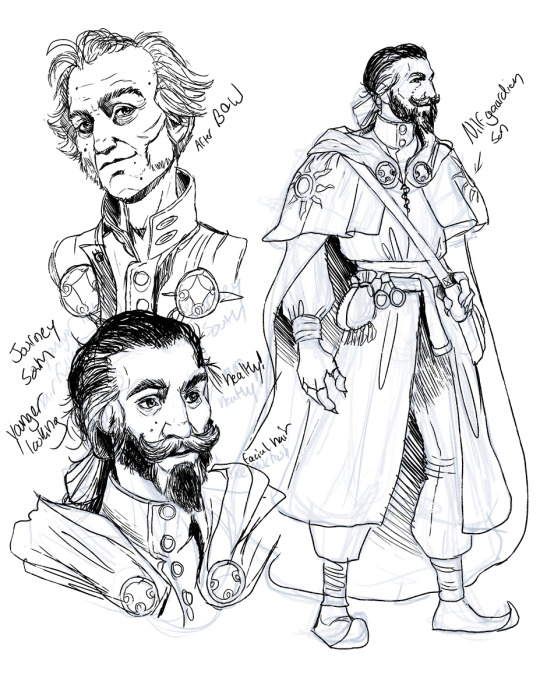
An illustration for a fic i have in the wings that is nearing its first draft completion.
Its going to be the story of what happens when Regis journeys south into Nilfgaard after the night of longfangs.
Its gonna feature a rare pair so rare i have never seen it written. And i am making a novel length story of it!
#witcher#emiel regis#the witcher#blood and wine#post blood and wine#fanart#healthy regis#regis with facial hair#regis looks friggan good with a well groomed beard and mustache.#regis
6 notes
·
View notes
Text

a little regis for the soul
#the witcher#emiel regis#the witcher fanart#the witcher regis#regis#emiel regis rohellec terzieff godefroy#tw3#tw3 fanart#tw fanart#blood and wine#tw blood and wine#art#digital art#fanart#artists on tumblr#my art#my posts#look !! at him
529 notes
·
View notes
Text
i will be the first to admit that this might be reaching a bit. also discussions of religious concepts in lgts ahead
so catholicism in lgts is explored through the struggles of living in a small catholic town like kieferberg, and literally everything about walpurga, the forest deity turned saint. but imo there's also something to be said about how elise obtains the tender flesh: this might be a reflection of the sacrament of the eucharist as understood during the medieval era.
but what is the eucharist anyway?
in catholic doctrine the eucharist is supposed to be the body of christ manifested through transubstantiation: the transformation of bread and wine into his flesh and blood respectively. this is based on the events of the last supper in the bible, wherein before his death jesus offers his body to his disciples through the bread and wine that they share. thing is, current understanding of transubstantiation is moreso in a metaphysical sense: catholics who do believe in it don’t actually think that they’re eating jesus’ physical body.
that wasn't always the case with medieval catholicism, however. there were theorists like st aquinas and berengar who argued for a metaphysical transubstantiation, but powerful church officials like cardinal humbert (who actually forced berengar to recount his claims) also believed that the faithful partaking in the eucharist were actually eating the literal, physical flesh and blood of jesus. there was quite a bit of concern too because of this: the body of christ, torn apart and chewed on by not just the faithful, but potential sinners?
the average catholic of that time probably didn't care much for the specifics of how transubstantiation worked (either way, the bread is/represents jesus, whether or not that was physical or not), but the point is there was an ongoing debate—if only among high-ranking church officials and theologians—about what the eucharist really was. now keep in mind that aforementioned literal physicality of the eucharist, and how similarly that plays out to the relevant witching hour segments in lgts.
i want to first highlight the scene where the crows in murim's domain rip out parts of elise's hair for the wheat testament:
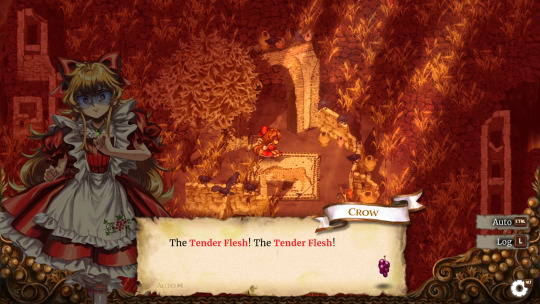


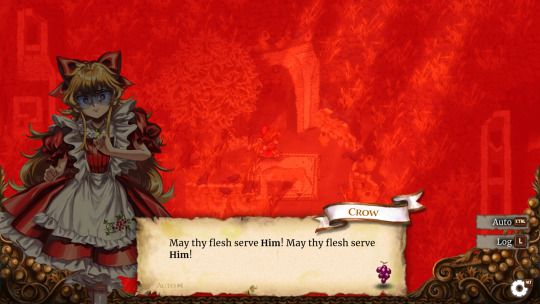
and the aftermath:

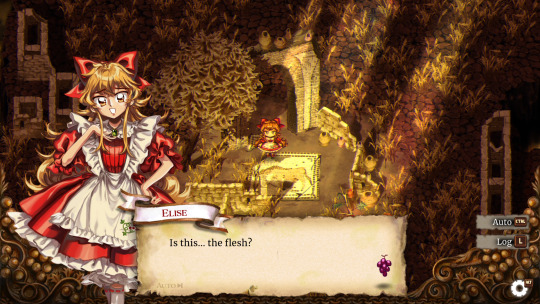
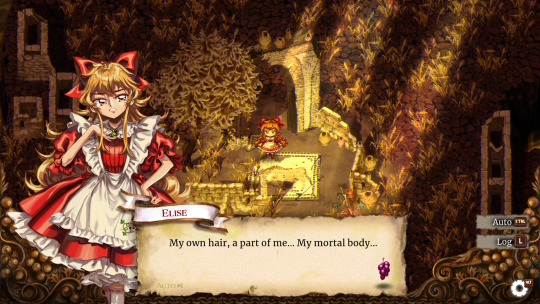
they sure are hungry, huh? and the way they get at elise is pretty violent, judging by her screams and the sounds of tearing flesh. their carnal hunger, expressed through their lines and the violence in how they form the wheat testament from her hair, brings to mind similar fears of an animalistic, near sacrilegious ingestion of a certain sacred body turned bread, only this time realized in a demonic trial. in other words, the entire trial subverts christ's supposed physical presence in the bread. besides, it's stated outright that elise is meant to physically combine a piece of her body—her hair—into that wheat.
she does just that in the windmill:
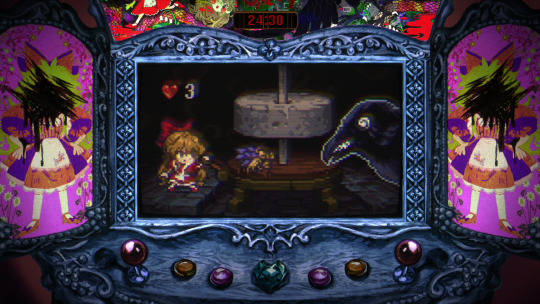

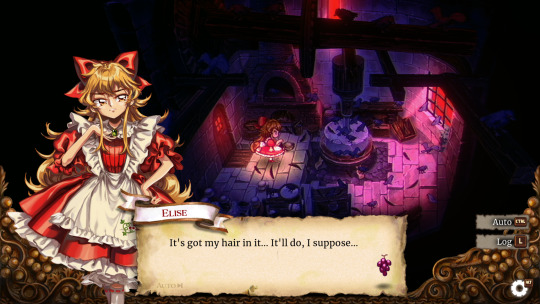
her hair baked into the (apparently unleavened) bread is the tender flesh that the crows hungered for, that would eventually find its way onto ozzy's table.
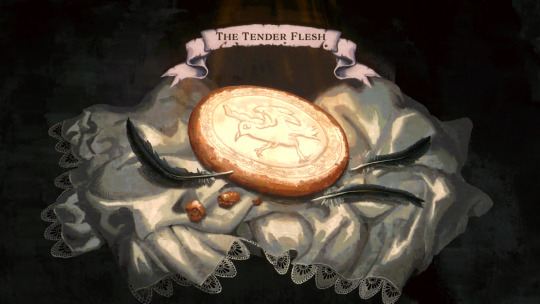
so the process of acquiring the tender flesh seems to imitate that transubstantiation in the celebration of the eucharist. if that's the case, i wonder why ozzy and his minions would design them this way…
btw here's my sources for medieval transubstantiation (despite my unhinged rambling i did do a bit of research):
https://www.jstor.org/stable/23964057 (Ego Berengarius by Chadwick, H., 1989)
https://global.oup.com/academic/product/some-later-medieval-theories-of-the-eucharist-9780199658169 (Some Later Medieval Theories of the Eucharist by Adams, M. M., 2010)
#little goody two shoes#lgts#elise lgts#father hans' study#considering that the game takes place from the pov of someone who's not a fan of the church#which considering that it's kieferberg is understandable#it's interesting how readily she throws herself into what's basically a subversion of one of catholicism's most central sacraments#and to her credit she does technically get what she wants#even if it is a monkey's paw#it gives me Feelings#haven't analyzed the sweetest nectar in connection to this yet#but there are some parallels i feel#or similar functions#as the wine accompanying the bread in the eucharist#so the sweetest nectar—which does look like red wine and is made from a mixture of blood and water—accompanies the tender flesh#definitely did not plan on posting this during holy week no not at allllll
24 notes
·
View notes
Text
Good evening, Hellsing 🛡️
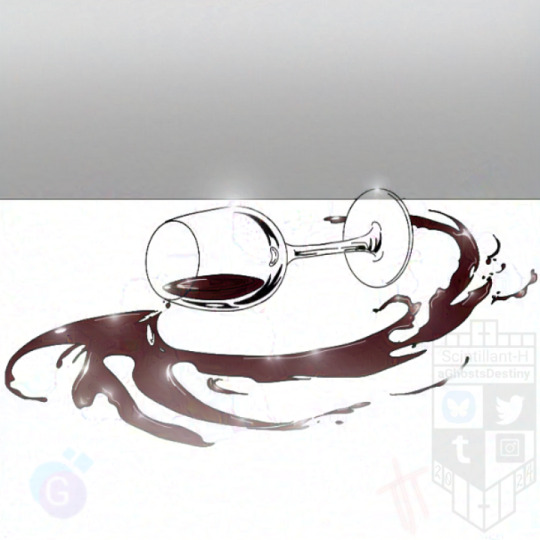
Shaking things up might be exactly what you, & the whole situation, needs. There will be mess, but youve known worse before. Bring extra towels. 🩸
30 notes
·
View notes
Note
⭐️
Hi, Faith! Thanks for the director's commentary ask.
I think I want to talk about Lonnie's role in Blood, Wine, & Roses. It's a slightly different take from what I've seen (not that I've seen much--I'm lucky if I read one fic every couple of months), and it's different from anywhere else I've written him. And I've written a fair bit about him by this point. His function in this story is a little different as well, both for what he represents and for how he accomplishes this within the narrative. I also want to talk about how Jonathan sees and responds to him, which is a bit different here as well.
Cut for discussion of child abuse (and Lonnie's whole deal) and for length (a LOT of length, sorry!). Apologies if it's a little disjointed or I repeat myself--I've had to leave and come back to it a bunch of times.
I want to preface this by mentioning that the title isn't just for show; it's claiming to be a retrospective because it is. These aren't static feelings at discrete points in time. It's all sort of an amalgam of what Jonathan remembers thinking and feeling and how he recalls these events, which is why it jumps back and forth. So it's a little contradictory in parts and doesn't necessarily read like the thoughts of a child that young because that's not the perspective of the story. I tried to imply that in parts, but I didn't want to necessarily beat anyone over the head with the framing. The other thing is that, conceptually, it's roughly broken down into four parts to explore these three aspects of Jonathan's relationship to masculinity: gender and gender roles, sexuality, gender expression, and the synthesis of all of these things. There's overlap, of course, but that was the idea.
Anyway, onward!
Lonnie
The Lonnie of this story has somewhat different goals and engages a little differently with his family because of this. He's still an abusive, manipulative schemer who routinely degrades and torments his family. But I wanted to do two things: strip some of that power, on one level, and on another to elevate it to show the real estate he came to occupy in this kid's mind. Maybe highlight it like a dye tracer lighting up a scan. That contrast between the reality and the idea--the grip he has on Jonathan's view of the world, so I could show it loosening. There's a lot of imagery in the fic as Jonathan is turning over his feelings on Lonnie, trying to figure him out, and it builds into this kind of primal folktale horror of his subconsciousness (and by the end, Jonathan becomes aware of and confronts this as well). So it's two sides of the same coin for Jonathan: the way he synthesizes everything he learns to reach a very intellectual conclusion (stripping that power, seeing Lonnie for what he really is and what made him) and the way he still, on a very deep emotional level, viscerally responds to Lonnie as a kid with coulrophobia would upon encountering Pennywise.
So what does this incarnation of Lonnie want? He wants to basically have the freedom to do the dumb shit he's already doing, either for fun or for profit. He wants his son to not embarrass him by being human and for that son to reflect a very specific concept of masculinity that he feels benefits him. He wants to push when it's fun and to be obeyed when the game isn't fun anymore--to see what Jonathan will do and to toughen him up. He wants to have his way, and in some spheres (his family, over whom he has a lot of power), he gets this. None of that is necessarily different from how I normally write him, but I peeled back the overlay just a bit in this one.
Lonnie largely achieves these simple, mundane goals. But this isn't a happy guy. He's not unhappy, necessarily--he's not suffering by any means--but happiness is not the absence of sadness. That's the deal with the food, though. (I also don't see him as particularly interested in food generally--it's just not something he remembers or, frankly, thinks of at all; I just expanded on that here.) In this story, the food is kind of a metaphor and kind of a straightforward demonstration of his attitude toward a lot of things. It's a potential path to connection and joy and love. Lonnie wants none of these things; he's offered them and he rejects them. So he's rejecting these things conceptually, but he's also, on a very literal level, rejecting Jonathan's offering to his face--he's rejecting his love and affection, while Jonathan is still young enough to try to offer it. This is partly a practical matter because he doesn't want Jonathan cooking or performing care-taking duties or other stereotypical feminine or "weak" things, so he's not going to encourage it. But he also doesn't see the value in what those things represent. (He also mocks Joyce's cooking--in essence, he's mocking her care-taking and disparaging her efforts, but he thinks that's what she's supposed to be doing. So he devalues these things generally.)
This is not a guy who considers the well-being of his family when he makes his decisions or when he reacts. He's certainly not concerned with destroying them. But he's also not necessarily setting out to do so. They're really just... there. When he wants something, they're resources; when they're impediments, he treats them as such. Is there a cruel streak? Yeah, I think I showed that pretty heavily. But a lot of this disregard is entirely down to indifference, immaturity, and selfishness. So that's not necessarily a very different side of Lonnie, but... I'm getting there.
We know that Jonathan, in the show, hates his dad. He harbors a lot of anger toward him, (rightfully) thinks the worst of him (see also: checking the fucking trunk), and resents him. While I don't think he would admit to being afraid of Lonnie, he very much does have Lonnie-shaped fears--some complex and nuanced and some more like the simple childhood terror sparked by shadows passing under the door. This is not a relationship he values, nor a man he loves.
But here's the thing:
1) Jonathan freely refers to his father as Lonnie, on several occasions, and probably does so with some degree of intention--he's signaling his disdain for Lonnie and his refusal to recognize Lonnie's connection to him. So I think it's a choice, not a habit, and I'm torn on whether or not Lonnie would give a shit about this--maybe in certain contexts he would, but overall he's too indifferent to fatherhood to care about Jonathan's opinion or respect. But there's this moment in S1 that's haunted me since I first saw it. When Joyce picks up the phone, thinking Lonnie is calling her back, Jonathan says, kind of stunned and under his breath, "Dad?" And it's so… There's something so heartbreaking about it. It's nakedly vulnerable and piercingly hopeful. And I think it's the first and last moment we see something like that--this idea that maybe his dad could come through after all when they're most in need, that there's a connection there, that they matter to this man on some level. That it's not completely impossible. And that's also where it dies when it becomes clear that Lonnie hasn't called. But if Jonathan had never cared about that man the slightest bit--if all he felt was uncomplicated loathing and rage--then that moment wouldn't have happened. I'm sure that he felt mostly anger and loathing on a conscious level, but some part of that kid either held some closely guarded shred of hope or was so shocked by Lonnie's apparent heel-turn that he momentarily hated Lonnie a tiny bit less. Some part of him maybe even wanted to believe that Lonnie was capable of doing the right thing--the absolute bare minimum--for once in his fucking life. And I wanted to explore that here because I don't know if I've personally seen that aspect discussed.
2) He's a child. Even if Jonathan on the show were completely dead-set against Lonnie and had no complicated feelings toward him, Jonathan is reflecting on various points in time during this story, including some when he was very young. And I'm not saying that all children have to love their parents, but... most want to. He's young enough, during the darkest parts of the story, to still be searching for that love. He's not a hardened ten-year-old.
3) Most people aren't on their worst behavior 100% of the time. They usually have their decent moments at least occasionally. Lonnie is an asshole and he doesn't give a shit about being a father, but, again, he's not looking to make Jonathan suffer; that's just an incidental thing that he's kind of indifferent to, something that he perceives as a weakness on Jonathan's part that Jonathan should be able to prevent and for which Lonnie is, therefore, not responsible. Because his goals and Jonathan's do not align in any way, and one of them is wrong, and if Jonathan could get with the program, then he probably genuinely thinks they'd get along better. But it's kind of an "even a stopped clock is right twice a day" situation.
Lonnie's Brush with Decency
Again, Lonnie isn't specifically setting out to torture Jonathan; that's a side effect of his actual goals that's acceptable to him, if not preferable. He just doesn't particularly value Jonathan's feelings and thinks that he should be tough enough to deal with discomfort because Lonnie is wrapped up in a lot of toxic masculinity bullshit and it shapes his interactions.
Here's where I think this story probably diverges from mainstream Lonnie: when he perceives genuine threat, he steps in and actually makes a brief protective gesture in Jonathan's direction (in "Dodge and Burn"). But it's not a noble gesture and it's not because he's secretly a decent guy or really loves this kid deep down.
There are a few things going on here. It comes back to that sense of ownership, in some ways--he can do whatever he wants to this kid, but that doesn't necessarily extend to everyone else in all scenarios. What he generally wants is for Jonathan to stand up for himself and show some spine, so I don't think he'd take joy in all of these potentially fucked up scenarios--provided he's not the one enacting them--but he wouldn't defend Jonathan in most of them. Some of them, maybe. So why does he in this one?
Well, is he really protecting Jonathan in the first place, or does Jonathan just perceive it that way? Lonnie is probably thinking of his reputation here more than Jonathan's safety; I imagined him blocking Jonathan from sight more than shielding him, you know? He's saying "don't look at this kid--pretend he's not here." This venture hasn't worked out the way he'd hoped, and he's regretting bringing him. Lonnie doesn't like being wrong, doesn't like looking foolish, and doesn't really like some of the people he has to deal with (particularly the ones with power over him), so he unloads all of these frustrations and all of this unease onto Jonathan.
And there's maybe a small part of him that does feel some flicker of something adjacent to paternal obligation--because he doesn't necessarily care about Jonathan and thinks he should be able to look after himself (and doesn't have sympathy or compassion for people he considers weak or pitiful)--but he's not completely indifferent to him at all times. It's like... if Jonathan were about to walk into traffic, Lonnie would grab his collar. He wouldn't just watch him get smeared by a passing truck. But that's the extent of the obligation. If the threat is real and valid to Lonnie, then it's conceivable that he would respond to it as one. That doesn't negate all of his other bullshit.
And Jonathan is very aware of this. He does want something from his father, but that's not it, and so he distrusts and resents this turn of events--and he's right to do so.
This scene contrasts sharply with Jonathan protecting Will in a scene that occurs earlier in the story but chronologically after the pivotal events of "Dodge and Burn".
“Don’t listen to him,” he said, automatic as breathing was supposed to be. “It’s okay to cry when it hurts. But you’re okay. You’re all right.”
She iced his wrist. Said it was okay to cry when it hurt. Said the kind lie. She’d never tell him to quit being such a pussy. She’d never tell him that because Dad was wrong, and he knew it, he knew it, he knew it.
So this is something that he's absorbed from Joyce and chosen to pass on to Will. It's a direct rejection of what Lonnie is trying to instill in him. Lonnie performs no care-taking and disparages it the whole story, so it's clear to Jonathan by this point that that's not something he wants to emulate. More on that below.
As a side note, the placement of "Dodge and Burn" within the story was deliberate. It's the heaviest scene, so I wanted to build the tension throughout the story with these glimpses of Lonnie's cruelty, disdain, and priorities, but I was also trying to show Jonathan working through it on his own. He's peeking at these memories around the edges, and it all leads up to that day in the woods before the first section ends.
Jonathan and Masculinity
Masculinity is not one thing. But Jonathan is steeped in a very specific and violent form of it, and this is what he's working through during the story.
Lonnie is that specific form of masculinity in action. Lonnie directly causes the material harms that Jonathan comes to associate with socially expected performances of masculinity (direct violence that he endures as well as a generally unsafe environment illustrated by the imagery he conjures), and it's Lonnie against whom he positions himself when he rejects this brand of masculinity. So he's rejecting it because he's rejecting Lonnie, but the crucial thing here is that he's not just rebelling against his shitty father--he's recognizing the greater absurdity of these expectations being forced on him (represented by Lonnie), and although he doesn't buy into them, they're nonetheless harmful in ways he can see and ways he can't.
He has all these other sources of proof that, actually, this masculinity shit is a trap. You can play the game, but everyone is losing--even Lonnie, King Shit of Masculinity Mountain. Lonnie is squeezed by these chains, too. It's a shitty way to live, even though he'd probably say that he's pretty content. He just can't see beyond those bars the way Jonathan can.
But you know what else Jonathan has? He has Joyce. I don't for one moment subscribe to the belief that abuse is inherently cyclic, at least in the way that it's popularly understood. (The "cycle of abuse" narrative typically oversimplifies a very complex subject in problematic and often harmful ways.) But we do learn from our environments, and especially from our families. Lonnie does not really love Jonathan, as an action--if he feels some type of affection for him untainted by his sense of ownership over him, then I'm not sure I'd call it love. Maybe he feels something, but he does not demonstrate love.
So this relationship and what it represents (that toxic masculinity that governs so much of their dynamic) will never be a source of safety or a place of belonging for Jonathan. But he could play the game, if he wanted to. He'd do it badly, but he could probably be worn down enough, under the right circumstances, to find it necessary to his survival to try a little harder. It's certainly a strategy, if not a desirable one.
Which isn't to say that I think he'd have grown up to abuse others without Joyce's tempering influence. (Again, it's much more complex than "A abuses B, therefore B goes on to abuse C because they never learned differently, until C breaks the cycle and does not go on to abuse D.") I think Jonathan is an innately kind person. That's just his personality. But I think that he was given space to express and nurture that kindness--limited, and within particular contexts, but nonetheless real. Joyce showed him kindness and gentleness and encouraged it when she saw it in him, and he had Joyce and Will to pour it into. So when he was watching the effects of so much cruelty--from his father, his peers, the town, society at large--it was contrasted with what he knew to be possible. He probably never would have bought into what Lonnie was selling, but he also had evidence of a better way and examples of how to do it.
But that's the idea behind "Dodge And Burn". I went really heavy on photography as metaphor in this story. It was a way of showing Jonathan taking charge of his narrative and his life. He's very powerless for a good portion of this story. But he's actively processing and reframing his experiences and observations every step of the way, trying to understand. At his rock bottom, after Lonnie violently lashes out at him in his anger and embarrassment, Jonathan is tired and ashamed and wants to make sense of how he's been treated.
The Light at the End of the Tunnel.
So that's what I'm driving toward: he's a kid, and the urge to make sense of the world never goes away but it's bone-deep at that age, and when you don't feel love surrounding you, you go looking for it. This is a time when Joyce has already pulled away from him; she's busy, she's relying on him to look after Will, and she's fighting with Lonnie when they're home. And he basically has nothing outside of these two relationships because his prospects are limited (by several things).
Basically, Jonathan knows what love looks like, but it's cold in that house these days. So he comes very close to justifying and accepting Lonnie's behavior. Because from the outside--seeing how he treats Joyce and Will--that's terrible and infuriating. But for himself? … Well, maybe that's just how it is. Maybe he's uniquely bad and deserves this. Maybe his expectations are unrealistic--they're too high. Maybe there's something to cling to there between all the pain, if only he can just accept Lonnie's premise.
I worried a little about that bit because it's obviously quite disturbing. It may even be more disturbing than the assault itself, that low moment where Jonathan considers whether this treatment is an acceptable facsimile for love and whether it's all he's entitled to, before he rejects it and, in doing so, validates his own self-worth. But I kept it in because I think it's important and realistic, and it shows how much of Jonathan's identity and perspective is a choice--not just because he's a nonconformist but because it means that his kindness is deliberate.
We search for love, and when we don't find it, we'll often create it to make sense of poor treatment. It's very common. And he's a child. This is a time when the anger hasn't yet crystallized. He's a kid in pain who wants for his father's behavior to not mean what it means. But it's pretty huge to say, no, this is not who I want to be to the world, this is not how I want to treat people and I don't have to and I will find a way not to, and I deserve more than this, too.
Does Lonnie actually feel remorse for his extreme reaction? For terrorizing his barely ten-year-old son on the side of the fucking road for the crime of being visibly afraid in a scary situation? Probably not, no. But Jonathan wants to believe that he does--in that moment, he wants to believe that his father is capable of that remorse and cares enough about him to feel it--so he briefly lets himself believe it. But even then, he knows that hope is dangerous and he talks himself out of that indulgence because he's a pragmatic kid and because it'll just hurt more next time if he hangs onto it. And there will be a next time. So he lets it go. It's an act of self-preservation, in one way, and in another a very painful realization not dissimilar to that moment in S1 when he very briefly thinks that Lonnie has actually called, then learns the truth.
So. Lonnie is a little different in this story because I wanted to expand on that moment in S1, and because I wanted to honor the kid Jonathan was (the kid who maybe still hoped his dad could be decent to him just once), and because so much of their dynamic is rooted in toxic masculinity that there was no way I could run with a Jonathan and masculinity prompt without digging into Lonnie Byers.
Anyway, I am SO SORRY for the length. I don't know what came over me. But, uh, I hope it was interesting?
#answered asks#writing tag#ask game#lonnie byers#jonathan byers#blood wine & roses#director's commentary#child abuse cw#long post#very long post
10 notes
·
View notes
Text

it's 3am so good morning I have wine and a fucking sore shoulder bc I can't sit like a human while I work on Him
#blood has zero shading rn don't look at it#but OMG not one of my fave blogs ever finding my blogs and following them T-T <333#astarion posting has only brought me joy#I've also learned that red wine and painting astarion goes beautifully well together#it's nearly 3am and I'm happy a clam with my drink and my art rn#but the cloth is done#he's almost done#working on hands rn so you already know i'm praying for death instead#the stone shouldn't take me all that long?#idk#I think I'm literally gaslighting myself into thinking this doesn't have another 10 hours of work in it when I KNOW it does#I just wanna be done T-T#bg3#astarion#bg3 fanart#astarion fanart#WIP#work in progress#my art
21 notes
·
View notes
Text
𝗚𝗮𝗹𝗲 𝗵𝗮𝘀 𝗮𝗻 𝗮𝗳𝗳𝗶𝗻𝗶𝘁𝘆 𝗳𝗼𝗿 𝗹𝗶𝗴𝗵𝘁𝗻𝗶𝗻𝗴 𝗮𝗻𝗱 𝗮𝗻 𝘂𝗻𝗰𝗮𝗻𝗻𝘆 𝘁𝗮𝗹𝗲𝗻𝘁 𝗳𝗼𝗿 𝗻𝗲𝗰𝗿𝗼𝗺𝗮𝗻𝗰𝘆. For him, the feeling of the latter—striking, palpable, entirely all-body—is addictive. It feels the most potent, singing through his body in a manner that thrills, and after calling down lightning in a flash of blue, its the fragrance of a storm that he's proud to wear. It makes his nerves feel alive. His every muscle feels wired. In a way, life's at its brightest when he plays with lightning, and mad in his eyes and wild in his hair, there's no element that comes close to besting it.
That said, however, it is necromancy that he's grown most adept in. Unfortunately, his relationship with it isn't half as kind as it is with lightning. Rotting from the inside, skin cracking nastily, Gale had grown desperate to control the orb. Because he's dying, he thought it best to study dying, poring himself endlessly in necromantic textbooks and experimenting (unsuccessfully) on his blight-gotten wounds. To note, necromancy itself isn't inherently evil. For example, it doesn't mean you support the raising of the dead. Rather, it's a study that's neutral just as any other, and as a study on forces from both death to life, Gale, with urgency, obsessively learned. With his year in solitude, it is feverishly that he took to necromancy. Somatically and verbally, his aptitude for the field is practically bar-none, and after Elminster helped tame the orb, the breadth of his studies comes to fruition. It isn't his favorite field, but he'd be lying if he said he didn't thoroughly enjoy it. It works well, anyway, considering his leaning for lightning; with necromancy chilling him, those violent bolts warm.
#HEADCANON.#I make it official. My Gale? Lightning and necromancy coded.#He smells like lightning and petrichor and wine and oud and parchment and#his blood tastes poisonous and rotting but BOGGED with the addictive tang of power#Gale taking to necromancy to try and undo what the orb was doing to him just makes sense to me#not that it ever got him anywhere but yknow.. a year all alone and wasting#makes you very very desperate.#this ties into my one headcanon where Gale was literally falling apart before he found out the only way to#calm the orb was to absorb magic. So imagine him studying necromancy desperately#as his nails took to rotting off or he started coughing up black blood#Lightning is what Gale loves. but his obsession toward necromancy was born out of necessity.#i just post mkre headcanons (mario vc) yahoo.#I know Gale is talented in magic but i have fun thinking all branches of magic are different#like art.#just cuz ur good at pencil art for example doesnt mean youre good at oil painting.#gale's the jerk that's good at every form of art in existence.
14 notes
·
View notes
Note
have you thought abt vamp dooku yet i can't remember.


#STOPPPPP#i saw a post about vamp dooku and i don't remember if i mentioned it because it was really.#i don't need this mental image.#OH yeah i mentioned count dooku as count drac awhile ago#☹️#i bet he doesn't even feed off of people . i bet he thinks thats far beneath him & he drinks all his blood like wine#dont enjoy this.#daisy.txt#moot tag#deimos#🌩️.dooku
9 notes
·
View notes
Text
Emiel Regis Rohellec Terzieff-Godefroy



I have developed a bit of a fascination with the images produced by the Midjourney AI so I've been trying a few things out on it.
The images above are what came out when I kept it very simple and asked for Emiel Regis from The Witcher.
I have to say, it's a weird process and I'm still learning how to tweak it but I am kinda in love with some of the images it makes. Thoughts?
#emiel regis rohellec terzieff godefroy#emiel regis#the witcher 3#the witcher#wild hunt#blood and wine#midjourney#midjourney ai#ai art#higher vampire#art post
75 notes
·
View notes
Text
Journey South: Preview Emhyr x Regis
For the second time that day Regis was led by the nose through the palace halls. The winding maze of stairs, rooms, and utterly chaotic setup made Regis’ head spin. This time instead of the audience chamber he was led into an anteroom, and then through another set of double doors. Once again Regis was floored by how beautiful everything was. His eyes gazed at the richly stained bookshelves which were notched between white marble columns with the same styling as the main audience chamber. But here, in this room, things were far more cozy. A fireplace lay without a fire, and before it was laid a rug with a black and orange striped cat. Around it were sitting chairs. Beyond that was a singular desk which stood away from everything else, but was beautiful all the same.
Emhyr stood up from behind the desk and came around it, just as Regis realized who was sitting at the desk. The vampire hastily bowed.
“I am sorry for the delay.” He began knowing that the Emperor likely had much to do. “I didn’t think I would be called, so I went with Morvran to the stables to look at his horses.”
It sounded like a lame excuse, and it was.
“Rise.” The Emperor’s voice commanded and Regis obeyed. “Mererid, please seat the gentleman and fetch some refreshments. Some light tea perhaps? Emiel, do you enjoy tea?”
“Oh very much so.” Regis felt himself flush from embarrassment.
“Very good, Tea then, preferably from the longshin company.” The Emperor brought a hand to his chin and his eyes unfocused for a moment. The action was so absolutely human it stunned Regis. “Perhaps some light Yuzu cake? The one with confectioners sugar not the glaze.”
“A very good choice.” Mererid nodded, then turned and lead Regis not to the desk, but to another small table away from it. “A gentleman will sit here.”
Regis sat gingerly, and let his eyes wander across the room. This place, like the throne room, was full of windows. The natural light that came through from the sun which was beginning it’s evening decent cast the room in a warm glow which took away from it’s sheer enormity and made it feel warm and inviting. He watched Mererid move off to the side of the room and speak into something within the wall and wait there straight backed.
“We shall speak candidly.” The Emperor began, not sitting, but pacing. A sign of nervousness perhaps? Regis glanced around at the guards which were placed in every nook of the room. “First, lighter fare, How did you enjoy the city?”
“It was wonderful.” Regis answered honestly, and Emhyr looked to him, his face a mask. “For a place so large, it is extraordinarily kept.”
“It is indeed.” Emhyr nodded. “But, what you see on the surface is not what the city is.”
Regis furrowed his brows watching the emperor as he paced over to the window.
“This glass, for instance, is over a foot thick, tempered in such a way it can take impacts from an Arbalist and not crack.” Emhyr looked out at the city. “And the city appears a beautiful place because a lot of people work tirelessly to make it so. They are the people, hidden away, who come through the city nightly, cleaning it and washing the streets. They are the pipers, and plumbers and the untouchables which keep the sewage flowing to our treatment plants. There are officers of the peace outside of our militarily armed soldiers. We have crisis handlers, physicians, and so many other people. The end result is what you see here, a beautiful place which everyone works to keep beautiful. We have no rules about what a building should be colored, but as you see, they are all beige and white. Nans sweep in front of their shops, even knowing that the sweepers come in the night to clear everything away. The people here take pride in this place.”
Regis nodded softly, yet he wondered where Emhyr was going with this.
“Many people see this city, and they give all the thanks to me.” Emhyr said, his voice carrying and rich. “Many people see this city and they think it is a place of excess. I see it and I still see far to much suffering. I see the problems, the breaks in the stone. I see the flaws here, where most people are spellbound by the city. Pride, Emiel is a dangerous thing. Outside of this city? My control slips. It slips more and more, and yet I want what we have here to be shared with the world. I dislike opulence, even as I live in the center of it. That rug? That was given to me by an Ofiri prince. I place it in front of my fire simply because someone gave it to me. The gilded gold here? It was done far into the past of this nation. I want the world to have the comfort we have here, and yet I despise it.”
“Since we are speaking candidly, if you could have any life which is not yours now, what would you choose?” Regis asked, and Emhyr looked to him in surprise.
“A life that I chose, would be a life I was forced into when I was a child.” Emhyr mused. “For nearly a decade I lived alone in the woods, only being seen by my most trusted men. I was a hunter. I made my living hunting and selling skins and meat to the local townsfolk. It was work I did, with my own two hands. Honest work, hard work, but a life which brought me joy in a time of bitter anger.”
“And you don’t think that this place has your hand within it?” Regis asked.
“I make big decisions.” Emhyr frowned. “I do not dictate when a public works project needs to be undertaken. The ministry of City and parks oversees that. I am the final stop of all big things, but I am not the one who hires a painter to refresh the walls of the city. I am the leader of all, they all listen to me, and if I wanted everyone to wear pink and white wigs, they would do it. But I am not the wigmaker, I am not the dye maker. I look at the end result of research, of votes, and of many discussions, and my own say, regardless of if I am right or not, is the final one. And they thank me for it. Local municipalities come to me only when they reach impasses.”
“But you hold court for common people, I witnessed that today.” Regis argued.
“And before I do so, they are seen to by a myriad of people who filter out things which would be a frivolity.” Emhyr said softly. “At last census we have five million people in this city alone. This city. And now I hold countries within my grasp that are so far away it can take months to travel there by horse. I am but one man, I want people to have what we have here, but it is a fight which I can not fight alone. I am good at strategy; I am good at looking at a map and seeing the movements of pieces like a game of chess. I am good at propaganda, and telling people what they need to hear to make them do as I wish.”
“Yet, as I stand here, looking, I know there are hundreds of swords pointing at my back.” Emhyr shook his head and turned to Regis. “I am a figurehead, yet I micromanage. I am an Ironfisted Ruler, and yet my people have freedoms. People see what I do, or what I don’t do and they see the opulence and the way I live. They see it and they envy it, and they think “If I just had the power I could make things better.” But none of them, not a one understands what power is. Power comes from small acts of peace. Not ham-fisted attempts at glory.”
“One would argue that you sought glory in capturing the northlands.” Regis said and Emhyr’s eyes sharpened.
“I sought one thing, and let others project their own wants where it was fitting.” Emhyr said his eyes burning into Regis’. “I sought my daughter.”
“The north fears you.” Regis replied. “They saw the men at your command, felt the sting of your blade, and the callousness at which you tossed man over man to meet your goals. Many experienced these acts first hand. Burning of villages, the rape of the young and defenseless. The burning of crops, the salting of the earth. I myself have been wrapped up in several entanglements with your men. They didn’t care that I was a surgeon, that I helped who needed it, that I would help them. Instead they tried to kill me. I have felt the war you waged, Emhyr, very keenly. You can not deny what was done in your name, and you can not deny that you didn’t know about it.”
“The north knows only the wars of it’s kings.” Emhyr said his tone mellow but his eyes burning fiercely. “Fear is a tool like any other. As is murder, rape, and pillage. Would I have approached them like a separatist group from the core, they would not have listened.”
“But some did.” Regis insisted. “Some listened, and in the end they lay with their heads rotting on walls.”
Emhyr nodded.
“I am not a good person.” Emhyr said at length, looking at Regis levelly. “I have never claimed to be. I will use the tools at my disposal and any means which are at the ready to bring my vision to fruition. I carry with me a great hubris, where I think I know what the world needs. Am I right? Am I wrong? It matters little. But I do have something not a lot of leaders have. I have experience as an untouchable, the lowest of the low. I have struggled to live in the way that the peasants have. I have been ostracized even from the poorest poor. And I know the stubbornness of those folk, the will to live which drives them to thieving, murder, and more. I know that they would have never listened to a man who speaks of a peace greater than they have ever known, for their lives were built on struggle, as were their parents, and their parents. Fear makes people listen. Fear is the whip which drives them into a pen where they will find food, shelter and a bath. They fear the whip, and some fight thinking that the pen is but a slaughter house in disguise.”
“When one meets a stray dog on the street it will bite you.” Emhyr said and sighed. “It fears you, fears the death which has been visited on others of it’s kin who have bitten the hand that attempts to feed it before. You must be violent with the cur, capture it against it’s will, punish it if it bites you, yet a dog is like humanity. You capture, and provide and soon the cur warms to you. You give it food, and shelter and a clean place to sleep, and soon the cur comes to you of it’s own accord. It will forget the sins which were committed to it’s brothers, it will forget the hard cold ground which it curled up on to sleep. It will know peace for what it is only after it struggles for it’s life and fears the one who gave it shelter.”
“In humanity that becomes a justification.” Emhyr continued. “A man will loathe me for killing his brother. Yet a man learns that he is not hungry, or thirsty and that he can exist without the struggle for his life. A man will resent me for the death of his brother, yet in the end, he will turn from that. He will think to himself, “If only my brother had not fought, he would have been with me, fed, and happy.”
“People don’t work like that.” Regis frowned.
“They do.” Emhyr insisted softly. “I have seen it in action time and time again. But it takes time, and effort. The rules must change for those who plundered the lands, and that change, when it takes place after a period of vast war, is a hard thing for those who suffered their wills on others to accept. Each time I have ended a war, the daggers at my back move closer. When I begin a new, they back away. They don’t understand it, they don’t understand that I want peace. That I want to look over the lands and see rulers who care about their people, helping them, and that I in turn will help the rulers. Instead a senate will vote for war again, and as an Emperor, I can refuse, but if I fail…”
Emhyr suddenly realized what he seemed to be talking about, and he frowned. Regis smiled softly.
“How strange.” Emhyr said, as Mererid approached the table seeming nervous and uncomfortable. “You have said barely a word…”
“You seemed to have much on your mind.” Regis said as the cake was laid out in front of him. “How often are you allowed to simply speak it?”
“You are not my doctor yet.” Emhyr frowned and approached the table. “My own thoughts got the best of me, a rare thing. I am supposed to be speaking to you about what you are here for. As I understand it, you were the one who rescued my nephew?”
“Rescued?” Regis frowned. “No, I was not the one who rescued him. It was days after he was rescued that I was brought in as a consult, and then when the castle doctor was unable to treat the sepsis, I stepped in.”
“And how long would it have been before he passed?” Emhyr asked, and surprisingly began to pour the tea.
“A day perhaps, two.” Regis replied, and then couldn’t help himself. “Shouldn’t I be doing this?”
“A host treats his guests.” Emhyr said and for the first time he had a soft smile on his face. “A rare thing to be served by an Emperor is it not?”
“In all of the list of impossibility’s, this one would have been so far buried that truthfully speaking I wouldn’t even think to imagine it.” Regis chuckled. “Forgive me of my impertinence, I am still learning the culture.”
“So he was two days at most from death.” Emhyr stated, and poured himself his own tea. “And you used a technique from my previous favorite doctor, and experimental one which had only been written about and tested in field hospitals.”
“There was a treatise published on it three years ago.” Regis smiled softly. “I had rather hoped to make my way here to speak with him about it. The use of fungal molds to fight bacterial infection is not a new science, as people have been molding bread in kitchens for ages for poultices, but breeding fungus with exact purpose and for intravenous use is an extremely novel and controversial thing in our field. Truth be told I had thought it utterly surprising to come across the treatise. Treatments like these are hoarded amongst the medical community. They are the gold in which we trade, but knowing now what I know of Nilfgaard, you conceder sharing information for the greater good a virtuous thing?”
“Indeed.” Emhyr nodded. “But even I had no idea of his pet projects. I simply funded them where I could and let him to his work. His death was an absolute tragedy, one I witnessed. I have seen many battles, and many corpses. But his shall stick with me, for I was there, and had I chosen to walk behind him instead of in front of him that day, he would still be alive.”
“You were upset with him?” Regis asked sipping at his tea. He nearly groaned. He hadn’t had good tea in a very long time.
“Indeed.” Emhyr said looking at Regis keenly. “And it was over something entirely petty. I had come to him with indigestion issues. He had told me to simply not eat as many of the heavy meals I had come to find delicious in the north, for they upset my humors. I asked him to prepare a medicament, and he told me to eat chalk. I thought he had insulted me. He was trying to explain it, but I was hearing nothing of it. In a single moment he stepped on his apron, rolled his ankle, and fell. He was dead quickly, and the autopsy had his death attributed to internal decapitation and blunt force trauma. His skull fractured and pierced his brain.”
Regis nodded softly.
“Go on, try the cake.” Emhyr urged cutting into his own piece with vigor. “I find it a perfect compliment to a day of toil.”
Regis did as he was bide, and took a bite. His mouth lit up in a cacophony of flavor centered around Vanilla, a rare herb indeed, and lemon. It was tart, sweet and creamy. He took a sip of his tea, and the flavors compounded and this time he did sigh.
“Now that you have eaten my food, you are welcome to my house.” Emhyr said. “But this is not just idle chitchat. I am indeed in need of a doctor. The one I have is adequate, but I do not get along with him. He has to much pride and far to little spine. I am not an easy person to get along with. If you come here expecting to be my friend, you will be sorely disappointed. I am prone to angry moods, and I dislike doctors, for they pry and prod. I still do not know you, and that in itself is a rare thing, and even rarer that I would allow one such as you, with such little history available, at my table.”
Regis swallowed, and took another sip of tea.
“You would not only be caring for me.” He said as Regis cut another bite of the cake. “You would be caring for my daughter, as well as my extended family while they are in residence. You did not impress Ciri today, and though I appreciated your candor, you did not impress me.”
Regis held his flinch at bay, and simply furrowed his brows.
“I dislike secrets, though I hold many.” Emhyr continued. “Tell me, if I asked, would you speak on my daughters health to me?”
“Is she of the age of majority?” Regis asked back, and the emperor frowned.
“Yes.” He said and cut a piece of his own cake.
“Then no.” Regis stated firmly. There was a brief flash of anger in Emhyr’s eyes, but it quickly slid back into his imperial mask.
“Why?” The Emperor demanded. Then he forked the piece of cake and shoved it in his mouth.
“Because privacy and the private treatments sought by individuals is of paramount importance.” Regis replied back. He was starting to truly dislike the man the more he spoke. “I would not speak of her, just as I would not speak of any private matter for any of my patients to curious parties. It is the one single thing I am not willing to bend on. I do not like how rulers send in soothsayers to prod doctors for signs of oncoming doom. I do not like it when Kings demand to know when their daughters and wife’s are ovulating, I am perfectly aware that the state deems it a deep necessity to know of the health and wellbeing of the ruling powers, but I will not say anything more then “She is healthy” to you or anyone else.”
“I could torture it out of you.” Emhyr growled, his eyes flashing with true rage.
“You could not.” The simplicity of Regis’ answer caught Emhyr off guard. “There is not a torture you could put me through that would make me break that vow. You attempted to drug me with mandrake distillate last night. For me, it simply makes it easier for me to speak of what is on my mind, nothing more. Had I not wanted to share what I shared, I would not have.”
“You defy me.” Emhyr growled. “And I can not get a read on you.”
Regis watched his nose flare and he frowned.
“What do you smell?” Regis asked.
“Horse.” Emhyr snapped. “Horse, my nephew, rose water, blood and pechitor. You had him bathed Mererid?”
“Yes your Majesty!” Mererid stammered. “He was given the full treatment, and a colonic to prevent anything from hampering the read.”
Emhyr glared daggers at Regis.
“I do not like this.” He growled and Regis could see a shimmer of sweat on his brow. “Take him away, Mererid, I need to think.”
“As you wish, your Majesty.” Mererid stammered and quickly darted to the table, where Regis was already standing. Mererid grabbed the unfinished cake and tea, and Regis looked to the Emperor who had stood as well. Regis was angry now. He looked to the Emperor coldly, and turned his back on him. He knew it was stupid to do so, but the Emperor had insulted him. Regis didn’t care in that moment if he was a god, he made Regis angry and tried to make him break his morals.
#Fanfic#Fanfiction#work in progress#snippet#WIP#Emiel Regis#emhyr var emreis#regis x emhyr#Post blood and wine#Witcher#the witcher#witcher rarepair#rare pair
10 notes
·
View notes
Text
sketchdump!!
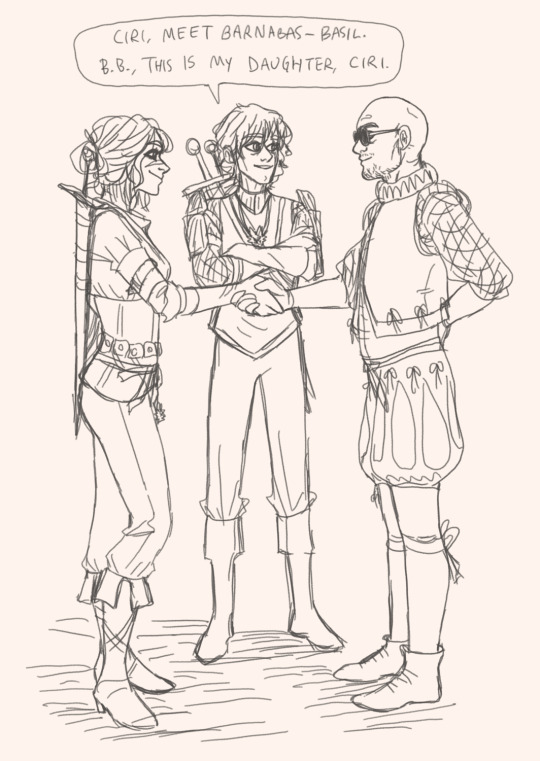

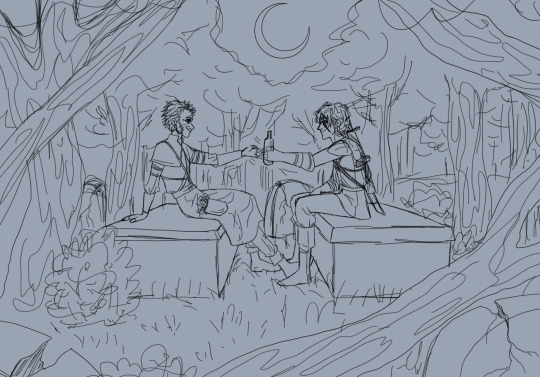

#it’s what they deserve#emiel regis#geralt of rivia#cirilla fiona elen riannon#ciri witcher#barnabas basil foulty#marlene tw3#finley cannot draw#the witcher#the witcher games#the witcher 3#blood and wine#the witcher wild hunt#LISTEN IM A SUCKER FOR POST PLOT DOMESTIC SILLINESS#I WAS OVERJOYED TO DISCOVER CIRI VISITING CORVO BIANCO AND THEN DEVASTATED TO FIND THAT I COULDNT#FORMALLY INTRODUCE HER TO BB#also I wanted regis to stay :(#i think geralt regis bb and marlene should have a family dinner at corvo bianco
35 notes
·
View notes
Text
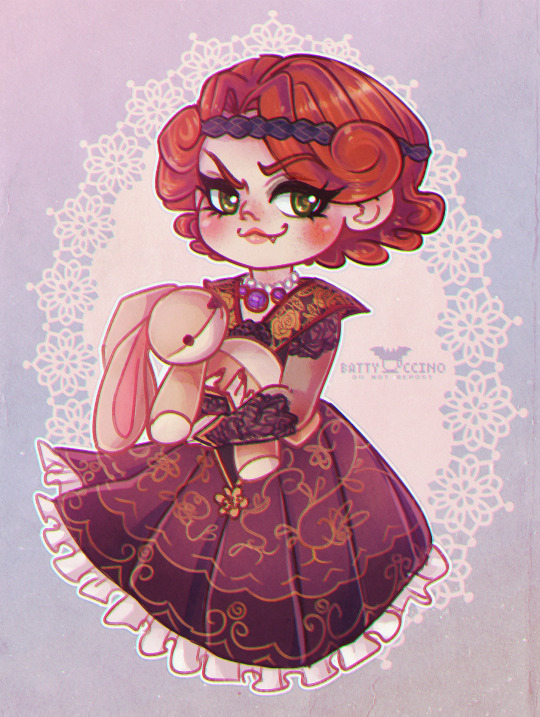
support me on ko-fi ◆ instagram
#the witcher#orianna#tw3#fanart#blood and wine#artists on tumblr#illustrators on tumblr#illustration#vampire#cute art#art:2023#not me wondering why I bother posting my Witcher art at all
24 notes
·
View notes
Text
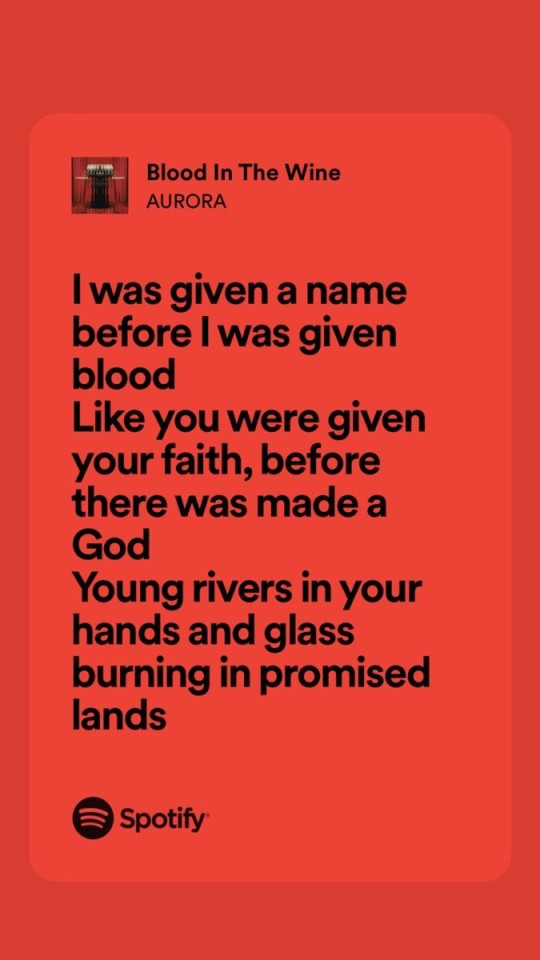
One of the best of her career 🕯🍷🌹
9 notes
·
View notes
Text
WIP Wednesday
Blood, Wine, & Roses
Nancy pulled him into the bathroom in her little apartment with a bubbly kind of excitement that fizzed all the way through him; pushed him down onto the edge of the bathtub with steady, careful hands. When she pulled a tube of lipstick out of her pocket, Jonathan watched her, always privately sort of fascinated watching her go through the motions of making herself up. But she reached for him instead, hovering, just for that last fraction of an inch, above his lips—eyebrows raised, head tilted, like you can say no.
He didn’t say no.
The lipstick was warm when it touched him, warmed from her pocket, close to the heat of her body. How long had it been there before he’d arrived? Had she carried it around all day, waiting for him while he sat on the train?
“It’s your color,” she said as she finished, thumb swiping at the corner of his mouth to catch an errant streak.
“Wine red, huh?”
“I’ve been waiting literal years to apply this properly. Let me admire my work.”
He almost bit his lip against the laugh leaping up from his throat, stopped at the last second so he wouldn’t mess up her handiwork. He’d never had to consider it before. Seemed like a lot to pay attention to, remembering not to mess with your lips, not to touch your face, not to sit with your legs uncrossed when you wore a skirt. Too much to think about, honestly.
But this was nice, when she turned him toward the mirror. She’d applied it so carefully, painted him up with tender hands so neatly, totally unlike the endearing but messy smear of red she’d left across his mouth before. More deliberate.
“I look hot,” he said.
“You are hot.”
“Are we still going out?”
Her eyes went serious. “That’s up to you.”
Whether he wanted to go out in clean jeans, a Clash t-shirt with only a couple holes, and with paint on his face.
#writing tag#blood wine & roses wip#jancy#jonathan byers#nancy wheeler#i think when i post this one i'm gonna put the jancy tag under additional tags#because they're together and that's important to him and everything#but this really is a story about jonathan and lonnie and i don't want to mislead people#i almost shared a bunch of other excerpts but they're genuinely so sad or kind of upsetting#that i figured i'd share one of the few nice parts instead
12 notes
·
View notes
Text

Who shot that arrow in your throat?
Who missed the crimson apple?
(It hung heavy on the tree above your head)
#kirehn draws#the hush sound#wine red#hush sound#digital art#art#artists on tumblr#digital painting#blood#should I give it some time to rest and look at it with fresh eyes for mistakes later?#probably#am I going to jump the gun and post it minutes after feeling finished? absolutely#I feel like I'll regret that decision but right this moment I'm happy with it and kind of tired of it at the same time#I'll be putting this in my inprnt later#I have a SECOND idea for later lyrics in the same song#don't have the energy for it right now but hopefully eventually#yeah that's the best tree I've painted in my life#do wish the arrow could stand out more but I'm note sure how to do that without greatly affecting the style of it in a bad way#anyway here you go
126 notes
·
View notes